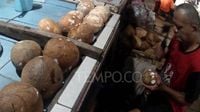The Indonesian government is currently considering several measures to address the ongoing coconut scarcity in the country, including a proposed temporary halt on the export of whole coconuts. This suggestion was first brought forward by the Ministry of Industry (Kemenperin) as a short-term solution to the dwindling supply of raw materials for the national coconut processing industry.
However, the Ministry of Trade (Kemendag) has indicated that this policy needs further discussion involving all stakeholders. On April 24, 2025, Fajarini Puntodewi, the Director General of National Export Development at Kemendag, stated that the policies related to coconut exports are still under review across various ministries and institutions. "We are still discussing and refining it further," said Fajarini in Jakarta.
She emphasized that any export policy concerning coconuts will take into account the interests of the entire supply chain, from upstream to downstream. "The main priority is to secure the domestic market while also promoting exports. Therefore, the policy will definitely be directed towards that," she explained.
In relation to the proposed moratorium on coconut exports, Fajarini noted that the final decision is pending the outcomes of discussions with stakeholders. "We will see the results, as we must consider both upstream and downstream aspects; everything must be taken into account. Thus, the policy will certainly be the most appropriate one," she added.
Meanwhile, Trade Minister Budi Santoso pointed out that high export prices for coconuts are contributing to the depletion of domestic stocks. He remarked that business owners prefer to export their coconuts due to the significantly higher prices in foreign markets. "The price is high because it is being exported. Export prices are indeed higher than domestic prices. As everything is exported, it ultimately leads to scarcity in the domestic market," Budi stated during a press conference in Jakarta on April 17, 2025.
Kemendag has been proactive in conducting meetings with industry players and coconut exporters in search of solutions to the domestic stock shortages caused by the high volume of exports. Budi emphasized the importance of coconuts as a commodity for farmers, exporters, and end-users alike. "If the price is low, farmers and exporters won't be interested either," he noted.
On April 24, 2025, a monitoring report from Tempo on the official Jakarta Food Information website revealed that the price of peeled coconut in Jakarta was fluctuating between Rp 15,000 and Rp 15,800 per kilogram. The lowest prices were observed in North Jakarta, Central Jakarta, and West Jakarta, where peeled coconuts were priced at Rp 15,000 per kilogram.
Interestingly, there was a decrease in the price of peeled coconuts in West Jakarta by Rp 1,250 per kilogram compared to the previous day. In South Jakarta, the price for one kilogram of peeled coconut was recorded at Rp 15,800, remaining stable since the day before. Conversely, East Jakarta saw an increase in the price of peeled coconuts, with the current price reaching Rp 833 per kilogram, which reflects a rise of Rp 110 compared to the previous day.
As discussions continue among government officials and industry stakeholders, the focus remains on balancing the needs of the domestic market while also considering the lucrative opportunities presented by international coconut exports. The complexities of the coconut supply chain and the pressures of global demand will undoubtedly shape the future strategies of both the Ministry of Industry and the Ministry of Trade.




